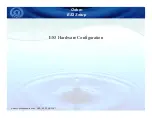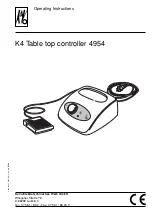
11
Securing Ring
End Cap
Sensor Block
Sensor Capsule
Temperature Compensator
Optional Water
Wash Nozzle
Optional Water Wash Feed Tube
Connecting Cable
Elbow Union
Ball Float
Boom
Sensor Pipe
5.1.2
Dip Systems
The procedure is identical to that for the Floating Ball System except
that, in this case, it is only necessary to remove and replace the
protective shroud instead of the ball. The shroud is removed from the
end of the sensor block by unscrewing it.
5.1.3
Submersible Systems
The procedure is identical to that for the Dip System – see Section
5.1.2 Dip Systems.
5.2
Replacing the Oxygen Sensor Block
5.2.1
Floating Ball System – Fig. 5.2
1) To avoid damaging the sensor capsule dry around it then carefully
remove it from the end of the sensor block and store safely. DO
NOT touch the membrane.
Caution. Do not leave the capsule exposed to air for
more than 30 minutes as the membrane will dry out.
2) Disconnect the cable from the dissolved oxygen transmitter (or
junction box if applicable) and attach a draw wire of suitable
length.
3) Slacken the cable gland on the end of the boom.
4) Remove the self tap screw and pull off the end cap.
5) Draw the cable through the gland.
6) Unscrew the securing ring of the ball float (whilst restraining the
ball from turning) and withdraw the ball from the elbow union.
7) Carefully unscrew the sensor block from the end of the sensor
pipe.
8) If fitted, disconnect the water wash feed tube from the sensor
block.
9) Pull the cable through the boom, leaving sufficient draw wire at the
end cap end to enable the replacement to be pulled through.
10) Disconnect the sensor block cable from the draw wire.
11) Attach the draw wire to the replacement sensor block cable and
re-assemble in the reverse order of the previous steps.
12) Remove the dummy capsule from the replacement sensor block
and carefully replace the sensor capsule into the sensor block.
5.2.2
Dip Systems
The procedure is identical to that for the floating ball system
except that it is only necessary to remove and replace the
protective shroud instead of the ball. Remove the shroud by
unscrewing it.
Fig. 5.2 Replacing the Oxygen Sensor Body
5
MAINTENANCE…
Summary of Contents for 9408 750
Page 1: ...Dissolved Oxygen Systems 9408 Series Instruction Manual IM 9408_7...
Page 17: ...15 NOTES...
Page 18: ...16 NOTES...






































